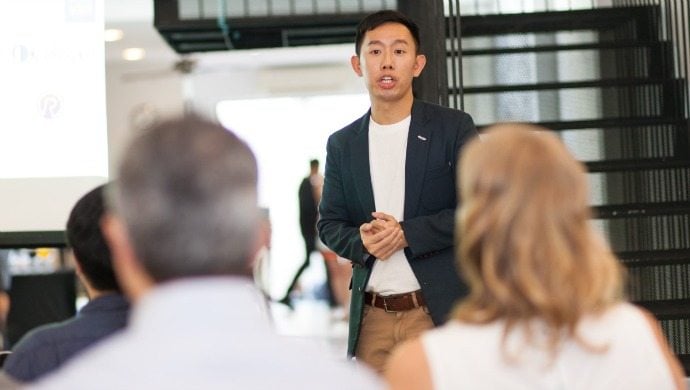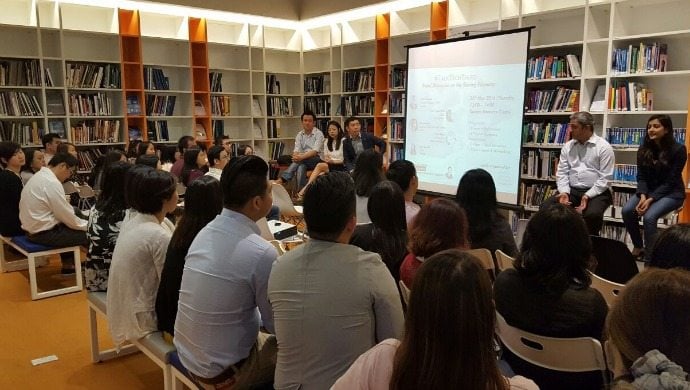Jim Tan, President of the Sharing Economy Association of Singapore, talks about the emerging trends and opportunities in Singapore, and how nonprofits and communities can participate in the sharing economy

Jim Tan, President of the Sharing Economy Association of Singapore, shares his passion for the sharing economy at a Minister of State meeting event. Photo credit: Tan Tan.
It’s no secret that the sharing economy is redefining the way we solve problems, offering us greater simplicity and convenience, while improving processes and efficiency in a market. The popularity of Airbnb, Grab, Uber, and other sharing economy giants across the globe is testament to how this generation is changing and adopting the sharing economy to enhance their quality of life.
All that excitement that the change brings has given rise to sharing economy enthusiasts, one of them being Tan Tan, President of the Sharing Economy Association of Singapore. Having joined the scene through his career in startups from about a year ago, the young leader admits that seeing how rapidly the sharing economy is changing people’s lives gives him an adrenaline rush.
Jim Tan shares his passion for the sharing economy at a Minister of State meeting event. Photo credit: Tan Tan.
Besides fulfilling his duties as Marketing & Communications Manager at GoGoVan, an on-demand delivery service that connects consumers and businesses to drivers for real-time logistics needs, Tan organizes networking sessions, governmental and agency discussions, expert workshops, as well as survey and research for members of the Sharing Economy Association of Singapore.
Tan aims to gain insight in order to develop a vibrant industry, and also to raise awareness about the sharing economy. Another objective of the association is to promote sustainable living and community bonding, which Tan believes is still at its infancy.
Also Read: Apple’s investment in Didi Chuxing and how it affects the Sharing Economy
In an exclusive interview, Tan talks about the emerging sharing trends and opportunities in Singapore, as well as how nonprofits and communities can participate in the sharing economy.
What drives your passion as President of the Sharing Economy Association of Singapore?
The sharing economy’s fast paced and ever-changing landscape is a huge contrast from working in corporate, but it has been a bitter-sweet experience. Not all sharing businesses will last, and I personally witnessed a couple of sharing businesses exiting the market due to lack of capital and product-market fit. It’s a pity to see them leave, but this is how the ecosystem runs.
From a business perspective, the sharing economy excites me more because it’s an entirely different algorithm in managing the supply and demand compared to traditional e-commerce. One has to constantly tweak either side to ensure they meet optimized balance points. It’s a trick that many sharing businesses have been struggling with, or succeeding with thanks to better data management.
As President of the Sharing Economy Association Singapore, I’d like to help reshape and enhance the current sharing economy landscape in Singapore. I see a lot potential to make the ecosystem much better with more interaction, communication and awareness. Seeing the association growing rapidly and the scene offering many opportunities for everyone, it shows huge potential to grow and influence as an association.

Jim Tan, pictured with sharing economy advisor and investor April Rinne at a networking session at Airbnb. Photo credit: Tan Tan
The association defines sharing economy as “the emerging economic model of sharing of physical and non-physical resources that is empowered by technology, peer-to-peer and social networks.” Many argue that the word “sharing” is a misnomer. Where do you stand on this issue?
The definition is ever evolving. The sharing concept has been around even when Singapore was still a Kampong village. Many people who stay in the village will hitch a ride to town; they will visit neighbour’s house for dinner; some may even sleep (couch-surf) in their neighbour’s house without monetary exchange. That’s the “Kampong spirit”. The villagers shared many resources and helped each other to fulfil certain tasks and get by, realizing mutual benefits.
The association is purely looking at anyone that brings value to the entire sharing ecosystem – optimizing/matching un-optimized resources to the demand with or without monetary exchange, be it a marketplace, an aggregator, a content creator, or any other supportive roles. The ecosystem will not grow just based on business itself. It involves the media, government, VC, consumers and many others to make one ecosystem sustainable. We welcome them all to the association.
How does growth in the sharing economy in Singapore compared to the rest of Southeast Asia?
I feel that the sharing economy in Singapore is blooming at a rapid rate and there’s still a huge potential to grow. I’d like to comment on a few factors of growth compared to SEA or the rest of the world:
Government policies: With the Singapore government pushes for startups, entrepreneurship, innovation, “smart nation” initiatives, and of course lower taxation, funding is flowing into the tech scene, which helps with the growth. The government’s reaction towards the sharing economy has been very welcoming compared to many SEA countries. Instead of banning them, our government bodies initiate dialogues and propose certain methods to mitigate the risk and concerns that traditional businesses voice.
One great example would be with the Grab and Uber issue, where the local transport authority implemented a training requirement for drivers to ensure that they are trained and equipped with the necessary ability to handle the job. This opened up more space for sharing businesses and also a better competitive market for both disruptors and traditional players.
Developed infrastructure: High mobile penetration, good Internet connection, credit card payment and high literacy rate – the infrastructure allows quicker establishment of business and startups.
Diverse culture and people: People with different religion, culture, ethnicity, and race are all grouped together in a small red dot on the map. This gives many startups a good testing bed for products and features. Also, due to our use of the English language and openness to the development, Singapore has quickly attracted many VCs and startups.
These factors have encouraged Grab to establish its HQ in Singapore, and Uber to use Singapore as its test ground for many product features. Also, the association has seen a growth of members from six members to 21 members in three years; this clearly shows that many sharing businesses are setting foot in Singapore.
Despite the above, Singapore has to continuously hunt or lure more international tech and engineering talents to support the growth of startups or the sharing economy.

Tan at a Singapore Tourism Board event, discussing sharing businesses’ impact on the tourism industry. Photo credit: Tan Tan.
The sharing economy is great, not just for entrepreneurs but also communities and nonprofit organizations working to promote social and environmental causes. How can the latter benefit from participating in the sharing economy?
A number of our members are non-profit and communities group. The most significant impact of sharing is environmental protection, for example, with UberPool and GrabHitch we need less cars, hence less fuel consumption, and less pollution.
Secondly, Singapore government advocates the 3R’s – Reduce, Reuse, Recycle. I would say that ‘Reuse’ is one aspect of the sharing economy. Re-allocating resources that is useless to one person to another one who can utilize it. One of our association members, Zero Waste SG, is a clear example of a non-profit organization (NPO) working within this aspect of the sharing economy. Foodbank Singapore also allocates unwanted food resources (still edible) to charity bodies who need them.
With better understanding of the impact of the sharing economy, more individuals and businesses will be more willing to share and amplify the effect; hence more people (especially those that cannot afford) get to benefit from it. Sharing NPOs who are more active and involved in the networking and dialogue sessions can increase awareness or even build partnership with businesses or government to push for more sustainable concepts in Singapore. Through small steps, we can move people to appreciate and react positively to the sharing economy.
—
Clarissa Santoso is a Marketing Communications Specialist at Arcadier, a SaaS company that powers next generation marketplace ideas. You can follow Arcadier on Twitter, Facebook, and LinkedIn for the latest insights on the sharing economy. The views expressed here are of the author’s, and e27 may not necessarily subscribe to them. e27 invites members from Asia’s tech industry and startup community to share their honest opinions and expert knowledge with our readers. If you are interested in sharing your point of view, submit your article here.
The post How Sharing Economy gives this young leader an adrenaline rush like no other appeared first on e27.